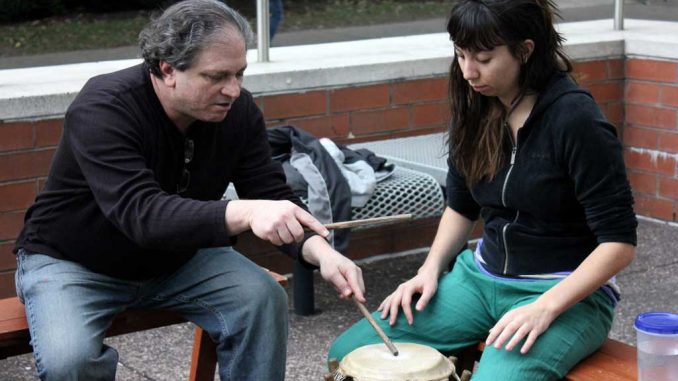

On any given Sunday, students passing by Tuttleman Learning Center may hear some intense drumming.
From 5 p.m. to 8 p.m., Dan Gorlin, founder and director of Alokli West African Dance, has been holding community classes on West African music. Alokli, meaning “the branch of a tree,” in Ewegbe, the language of the Ewes of West Africa, is a dance-drumming club that started on the West Coast.
Gorlin, originally from Los Angeles, established the program in Philadelphia about 11 years ago. Instructors Gorlin and Peace Elewanu, an internationally celebrated dancer, teach and perform the music of West Africa with students. One of Alokli’s main goals is to preserve the tradition of West African music. Some of the most common instruments they use besides drums are bells, rattles and xylophones.
Gorlin said he wants to “let people know about African culture.” In Africa, there are thousands of ethnic groups, and Gorlin said that any song a person plays and dubs “African music” is being too broad in his or her description.
Alokli released a songbook and CD of West African music.
“Almost no one else in the world has stopped and documented these songs,” Gorlin said, citing the reason as the fact that such music is “hard to notate.”
Gorlin described the difficulty of playing such music as similar to the challenges of playing jazz music. Though the music is written out, the sound and style cannot be formally taught without audio reference, which is why the songbook comes with a CD.
Alokli began in Los Angeles and San Francisco, but Gorlin has relocated his work to Philadelphia, which, according to the organization’s website, creates “music and dance indigenous to the peoples of Philadelphia.”
Gorlin first encountered the music of West Africa when attending the California Institute of the Arts for classical piano. There, he said he met an African family and their cultural music, and sort of got “sucked into it.” Gorlin became more intrigued with the culture when he traveled to Africa in the 1970s.
Alokli, Gorlin said, does shows for special events, such as the Philadelphia marathon, but mainly performs and offers classes in schools. From elementary to college education, Alokli brings the culture of Ghana and other West African countries and ethnicities to students.
At Temple, these classes are open to anyone. The class does not count as credit for current students, but it is free for anyone interested.
Mellisa Pascale can be reached at mellisa.pascale@temple.edu.



Is there some special meaning to doing this in front of Paley Library?